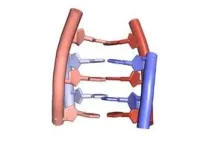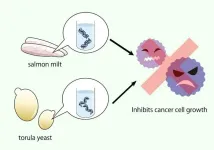(Press-News.org) Scientists have revealed how a “tag-team” between the oceans and continents millions of years ago devastated marine life – and altered the course of evolution on Earth.
Their study has unearthed a new explanation for a string of severe environmental crises, called oceanic anoxic events, which happened between 185 and 85 million years ago.
These occurred when the seas became critically depleted of dissolved oxygen.
Experts from the University of Southampton, which led the study, said these events triggered significant biological upheavals, including mass extinctions of marine species.
The findings are published today Thursday 29 August in Nature Geoscience.
Lead author Tom Gernon, a Professor of Earth Science at Southampton, said: “Oceanic anoxic events were like hitting the reset button on the planet’s ecosystems.
“The challenge was understanding which geological forces hit the button.”
The study was undertaken by Southampton in collaboration with academics from the universities of Leeds, Bristol in the UK, Adelaide in Australia, Utrecht in the Netherlands, Waterloo in Canada, and Yale in the US.
The researchers examined the impact of plate tectonic forces on ocean chemistry during the Jurassic and Cretaceous Periods, collectively known as the Mesozoic era.
This chapter of Earth’s history is often dubbed the age of the dinosaurs, said Prof Gernon, and is famously exposed along the Jurassic Coast on the UK’s south coast as well as along the cliffs of Whitby in Yorkshire and Eastbourne in East Sussex.
The team combined statistical analyses and sophisticated computer models to explore how chemical cycles in the ocean could have feasibly responded to the breakup of the supercontinent Gondwana, the great landmass once roamed by the dinosaurs.
Prof Gernon added: "The Mesozoic era witnessed the breakup of this landmass, in turn bringing intense volcanic activity worldwide.
"As tectonic plates shifted and new seafloors formed, large amounts of phosphorus, a nutrient essential for life, were released from weathering volcanic rocks into the oceans.
"Crucially, we found evidence of multiple pulses of chemical weathering on both the seafloor and continents, which alternately disrupted the oceans.
“It’s like a geological tag-team," said Prof Gernon.
Experts from the universities found the timing of these weathering pulses matched up with most oceanic anoxic events in the rock record.
They propose that the weathering-related influx of phosphorus to the ocean acted like a natural fertiliser, boosting the growth of marine organisms.
However, the researchers said these fertilisation episodes came at a major cost for marine ecosystems.
The increase in biological activity led to huge amounts of organic matter sinking to the ocean floor, where it consumed large quantities of oxygen, said co-author Benjamin Mills, a Professor of Earth System Evolution at the University of Leeds.
He added: “This process eventually caused swathes of the oceans to become anoxic, or oxygen-depleted, creating ‘dead zones’ where most marine life perished.
“The anoxic events typically lasted around one to two million years and had profound impacts on marine ecosystems, the legacy of which are even felt today.
“The rocks rich in organic matter that accumulated during these events are by far the largest source of commercial oil and gas reserves globally.
As well as explaining the cause of extreme biological turmoil in the Mesozoic, the study’s findings highlight the devastating effects that nutrient overloading can have on marine environments today.
The team of researchers xplained how present-day human activities have reduced mean oceanic oxygen levels by about two per cent - leading to a significant expanse in anoxic water masses.
Prof Gernon added: “Studying geological events offers valuable insights that can help us grasp how the Earth may respond to future climatic and environmental stresses.”
Overall, the team’s findings reveal a stronger-than-expected connection between the Earth’s solid interior and its surface environment and biosphere, especially during periods of tectonic and climatic upheaval.
“It’s remarkable how a chain of events within the Earth can impact the surface, often with devastating effects”, added Prof Gernon.
“Tearing continents apart can have profound repercussions for the course of evolution”.
about the study in Nature Geoscience at https://doi.org/10.1038/s41561-024-01496-0.
ENDS
670 WORDS
END
Land-sea “tag-team” devastated ocean life millions of years ago reveal scientists
String of severe environmental events 100 million years ago triggered mass extinctions of marine species
2024-08-29
ELSE PRESS RELEASES FROM THIS DATE:
Researchers map 50,000 of DNA’s mysterious ‘knots’ in the human genome
2024-08-29
Researchers map 50,000 of DNA’s mysterious ‘knots’ in the human genome
Innovative study of DNA’s hidden structures may open up new approaches for treatment and diagnosis of diseases, including cancer.
DNA is well-known for its double helix shape. But the human genome also contains more than 50,000 unusual ‘knot’-like DNA structures called i-motifs, researchers at the Garvan Institute of Medical Research have discovered.
Published today in The EMBO Journal is the first comprehensive map of these unique DNA structures, shedding light on their potential roles in gene regulation involved in disease.
In a landmark 2018 study, Garvan scientists ...
Can fungi turn food waste into the next culinary sensation?
2024-08-29
Chef-turned-chemist Vayu Hill-Maini has a passion: to turn food waste into culinary treats using fungi.
One of his collaborators is Rasmus Munk, head chef and co-owner of the Michelin two-star restaurant Alchemist in Copenhagen, who serves a dessert — orange-colored Neurospora mold grown on rice — inspired by Hill-Maini.
For the past two years, Hill-Maini has worked with a team of chefs at Blue Hill at Stone Barns, a Michelin two-star restaurant in Pocantico Hills, New York, to generate tasty morsels from Neurospora mold grown on grains and pulses, including the pulp left over from making oat ...
Women with endometriosis at greater associated risk of heart attack and stroke
2024-08-29
London, United Kingdom – 29 Aug 2024: According to research presented at ESC Congress 2024,1 women with endometriosis have a 20% greater risk of significant cardiac outcomes compared with women without endometriosis.
“For decades, cardiovascular disease (CVD) has been thought of as a man’s disease and risk factors have been considered from the male perspective, for example, including erectile dysfunction in guidelines on CVD risk assessment.2 Yet, 1 in 3 women die from CVD and 1 in 10 women suffer from ...
Catching up on sleep on weekends may lower heart disease risk by up to 20%
2024-08-29
London, United Kingdom – 29 August 2024: The demands of the working week, often influenced by school or work schedules, can lead to sleep disruption and deprivation. However, new research presented at ESC Congress 2024 shows that people that ‘catch up’ on their sleep by sleeping in at weekends may see their risk of heart disease fall by one-fifth.
“Sufficient compensatory sleep is linked to a lower risk of heart disease,” said study co-author Mr Yanjun Song of the State Key Laboratory ...
Quitting smoking nearly halves heart attack risk, cutting down does little
2024-08-29
London, United Kingdom – 29 August 2024: According to research presented today at ESC Congress 2024,1 patients with stable coronary artery disease who quit smoking at any timepoint after their diagnosis reduced their risk of a major event by almost 50%. In contrast, there was minimal impact on cardiovascular risk in patients who reduced their smoking habits.
The international CLARIFY registry (prospeCtive observational LongitudinAl RegIstry oF patients with stable coronary arterY ...
Children contribute to group projects when there are clear and common goals
2024-08-29
Children can work together to reach a target that benefits a whole group even if it is at a personal cost to themselves, a new study has shown.
Researchers invited groups of six to 10-year-olds to take part in a game where they were each given containers of water and could decide how much of it to offer into a common pool.
If the group contributed a certain amount of water it resulted in benefits for the whole group, but children also obtained benefits for any water they kept.
At the same time, the ...
Dine on DNA: Compounds from nucleic acids in food show anticancer effects
2024-08-29
When people eat, they ingest the nucleic acids that reside in all living things. The compounds in these acids could inhibit the growth of cancer cells, according to findings published in PLOS ONE by Osaka Metropolitan University Associate Professor Akiko Kojima-Yuasa of the Graduate School of Human Life and Ecology and colleagues.
Consuming nucleic acids found in food has been shown to boost the immune system and prevent some diseases. The nucleotides and nucleosides that result from digesting the acids are largely responsible for these beneficial effects.
Professor ...
MCG scientists working to understand why men with prostate cancer are at higher risk of Alzheimer’s
2024-08-29
AUGUSTA, Ga. (Aug. 29, 2024) – Researchers at the Medical College of Georgia at Augusta University are searching for a better way to understand why many men with prostate cancer end up with Alzheimer’s disease, and whether it’s the standard hormone therapy treatment or an overactive immune response that actually contributes to the problem.
The hormone therapy, androgen deprivation therapy, known as ADT, treats the cancer by reducing testosterone, which the cancer needs to grow. But androgen is a key regulator of amyloid metabolism and when it’s removed from the equation, more amyloid is left to form the plaques that are a hallmark of Alzheimer’s.
“We ...
Ancient sea cow attacked by a crocodile and sharks sheds new light on prehistoric food chains
2024-08-29
A new study describing how a prehistoric sea cow was preyed upon by not one, but two different carnivores – a crocodilian and a shark – is revealing clues into both the predation patterns of ancient creatures and the wider food chain millions of years ago.
Published in the peer-reviewed Journal of Vertebrate Paleontology, the findings mark one of the few examples of a creature being preyed upon by different animals during the Early to Middle Miocene epoch (23 million to 11.6 million years ago).
Predation marks in the skull indicate that the dugongine sea cow, ...
Georgia Tech neuroscientists explore the intersection of music and memory
2024-08-29
By Jerry Grillo
The soundtrack of this story begins with a vaguely recognizable and pleasant groove. But if I stop writing and just listen for a second, the music reveals itself completely. In Freddie Hubbard’s comfortable, lilting trumpet solo over Herbie Hancock’s melodic, repetitive piano vamping, I recognize “Cantaloupe Island.” Then, with my fingers again poised at the keyboard, Freddie and Herbie fade into the background, followed by other instrumental music: captivating — but not distracting — sonic nutrition, feeding my concentration and productivity.
Somewhere, I think, Yiren Ren is studying, focused on her ...
LAST 30 PRESS RELEASES:
Natural selection operates on multiple levels, comprehensive review of scientific studies shows
Developing a national research program on liquid metals for fusion
AI-powered ECG could help guide lifelong heart monitoring for patients with repaired tetralogy of fallot
Global shark bites return to average in 2025, with a smaller proportion in the United States
Millions are unaware of heart risks that don’t start in the heart
What freezing plants in blocks of ice can tell us about the future of Svalbard’s plant communities
A new vascularized tissueoid-on-a-chip model for liver regeneration and transplant rejection
Augmented reality menus may help restaurants attract more customers, improve brand perceptions
Power grids to epidemics: study shows small patterns trigger systemic failures
Computational insights into the interactions of andrographolide derivative SRJ09 with histone deacetylase for the management of beta thalassemia
A genetic brake that forms our muscles
CHEST announces first class of certified critical care advanced practice providers awarded CCAPP Designation
Jeonbuk National University researchers develop an innovative prussian-blue based electrode for effective and efficient cesium removal
Self-organization of cell-sized chiral rotating actin rings driven by a chiral myosin
Report: US history polarizes generations, but has potential to unite
Tiny bubbles, big breakthrough: Cracking cancer’s “fortress”
A biological material that becomes stronger when wet could replace plastics
Glacial feast: Seals caught closer to glaciers had fuller stomachs
Get the picture? High-tech, low-cost lens focuses on global consumer markets
Antimicrobial resistance in foodborne bacteria remains a public health concern in Europe
Safer batteries for storing energy at massive scale
How can you rescue a “kidnapped” robot? A new AI system helps the robot regain its sense of location in dynamic, ever-changing environments
Brainwaves of mothers and children synchronize when playing together – even in an acquired language
A holiday to better recovery
Cal Poly’s fifth Climate Solutions Now conference to take place Feb. 23-27
Mask-wearing during COVID-19 linked to reduced air pollution–triggered heart attack risk in Japan
Achieving cross-coupling reactions of fatty amide reduction radicals via iridium-photorelay catalysis and other strategies
Shorter may be sweeter: Study finds 15-second health ads can curb junk food cravings
Family relationships identified in Stone Age graves on Gotland
Effectiveness of exercise to ease osteoarthritis symptoms likely minimal and transient
[Press-News.org] Land-sea “tag-team” devastated ocean life millions of years ago reveal scientistsString of severe environmental events 100 million years ago triggered mass extinctions of marine species







